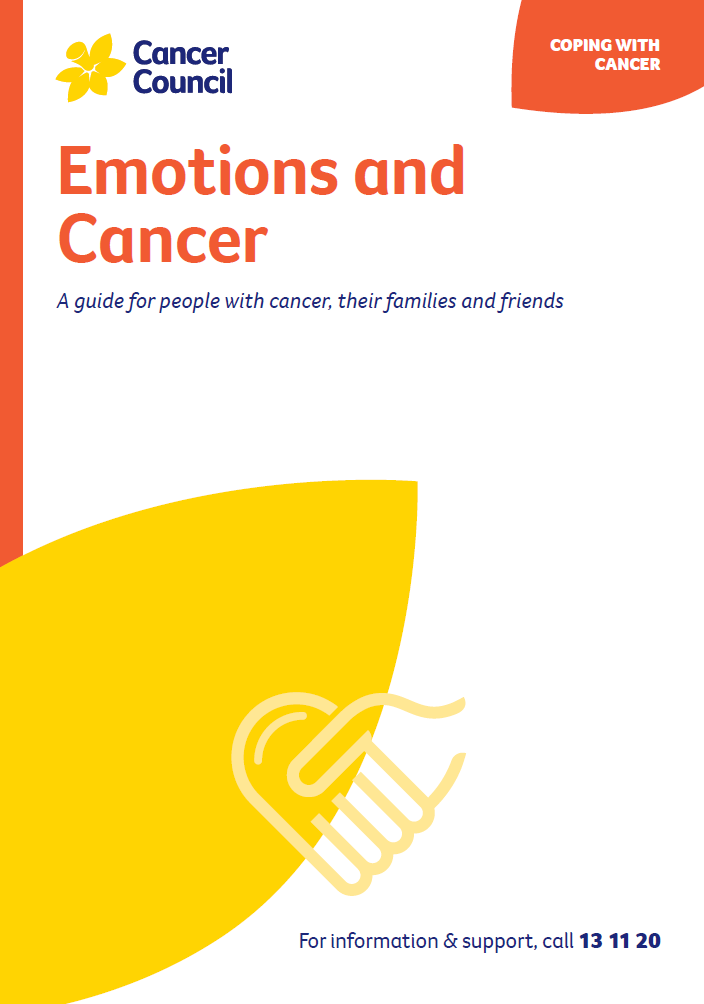- Home
- About Cancer
- Supporting someone with cancer
- Caring for someone with cancer
- Your role as a carer
- Emotional support
Emotional support
An important part of the carer’s role can be to provide emotional support to the person with cancer. Your presence can help them feel less isolated and lets them know you care.
Learn more about:
Sharing how you feel
Finding it hard to talk about cancer
You might want to talk to the person about their cancer diagnosis and treatment, but not know how. This may be because you:
- fear saying the wrong thing or don’t want to say something upsetting
- feel you shouldn’t talk about the cancer
- don’t know what to say or how to respond
- feel you have to be supportive and strong for the person with cancer, and worry you could become emotional.
Understanding emotional responses
It’s likely the person you’re caring for will experience a range of strong emotions. It can help to ask if they would like to talk. Sometimes they might talk openly about how they’re feeling. Other times they may prefer not to share their thoughts, and it’s important to respect this. They may also try to hide their feelings because they don’t want to upset you.
Having open and respectful conversations
Try not to change the subject if a conversation gets uncomfortable. Instead share how you feel and respect each other’s feelings. It’s natural to have disagreements from time to time, especially when you’re both under stress. Although dealing with conflict can be hard, it can also bring you closer together and help you understand each other’s point of view. See below for tips on resolving conflict.
While you may be the main source of emotional support, you can encourage the person you’re caring for to speak to family members, friends or health professionals who can provide emotional support in different but valuable ways.
Ways to communicate
Be a good listener |
Resolve conflict |
|
|
→ READ MORE: Communicating with others
Podcast: How to Help Someone with Cancer
Listen to more of our podcast for people affected by cancer
Dr Alison White, Palliative Medicine Specialist, Royal Perth Hospital, WA; Tracey Bilson, Consumer; Louise Dillon, Consumer; Louise Durham, Nurse Practitioner, Palliative Care Outpatients, Princess Alexandra Hospital, QLD; Katrina Elias, Carers Program, South Western Sydney Local Health District, NSW Health, NSW; Jessica Elliott, Social Worker, Youth Cancer Services, Crown Princess Mary Cancer Centre, Westmead Hospital, NSW; Brendan Myhill, Social Worker and Bereavement Research Officer, Concord Repatriation General Hospital, NSW; Penny Neller, Project Coordinator, National Palliative Care Projects, Australian Centre for Health Law Research, Queensland University of Technology, QLD; Olivia Palac, Acting Assistant Director, Occupational Therapy, Gold Coast University Hospital, QLD; Nicole Rampton, Advanced Occupational Therapist, Cancer Services, Gold Coast University Hospital, QLD; Shirley Roberts, Nurse Consultant, Medical Oncology, Northern Adelaide Cancer Centre, SA; Dr Elysia Thornton-Benko, Specialist General Practitioner, and UNSW Research Fellow, NSW; Kathleen Wilkins, Consumer; Helen Zahra, Carers Program, South Western Sydney Local Health District, NSW Health, NSW.
View the Cancer Council NSW editorial policy.
View all publications or call 13 11 20 for free printed copies.
